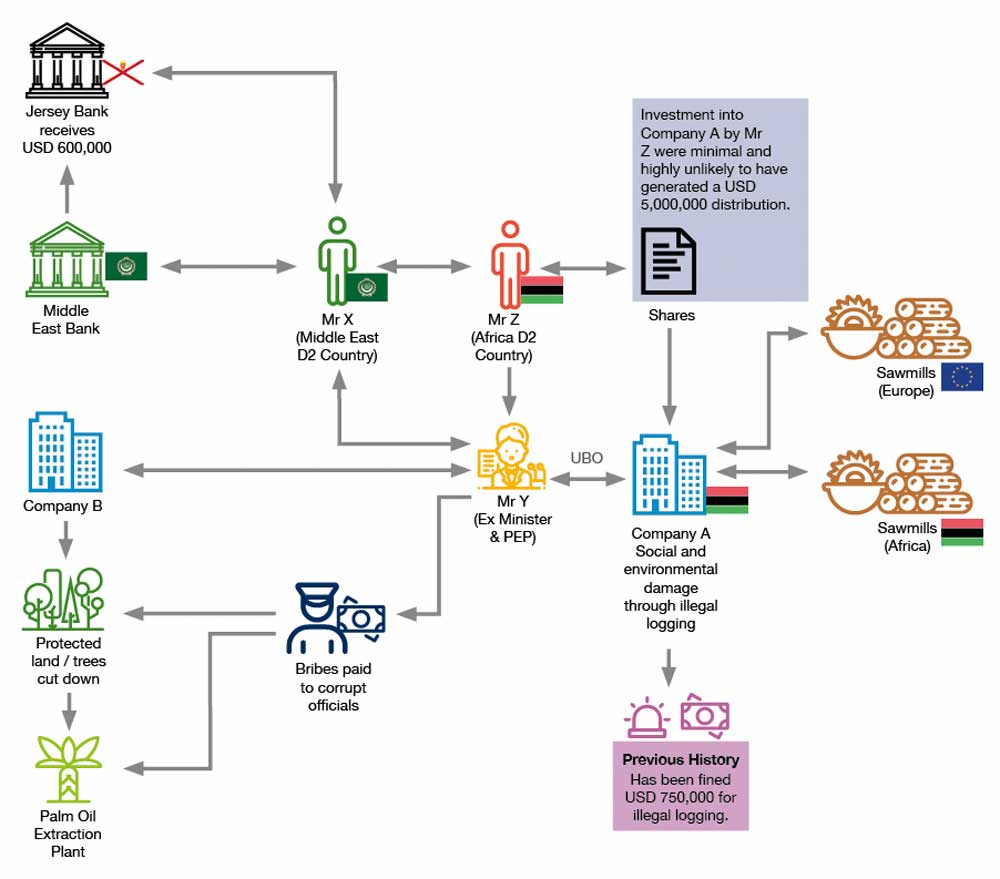A Jersey-regulated bank has flagged unusual activity on Mr X’s account. The alert highlighted rapid fund movements, atypical patterns of debits and credits, and cross-border transactions involving high-risk jurisdictions.
Mr X resides in a country in the Middle East which is classified on the Jersey Financial Services Commission (JFSC) D2 higher risk list. Mr X is 40 years old and works as a remote Human Resources (HR) recruitment specialist in the same country, with stated earnings of GBP 20,000 per annum.
Mr X opened a retail account in Jan 2024. In his application form, he stated the following:
An annual review of the account revealed that, over a six-month period, Mr X received six credits from his external account with another Middle Eastern bank, totalling USD 600,000, and a USD 50,000 credit from a bank in France - again, under his name.
As part of the review, the bank contacted Mr X for an explanation relating to the source of these different funds.
Mr X explained that his father’s brother-in-law, Mr Y, owned Company A, which is based in a D2 high-risk country in Africa. Mr X’s late father, Mr Z, had invested in this company. Following Mr Z’s recent passing, the family reached an agreement with Mr Y to sell their shareholding in Company A. The total value of the shares to be distributed among the family members is USD 5,000,000. Mr X stated that he and his four siblings would share this amount, with an initial payment of USD 600,000 already received and a further USD 400,000 expected to follow.
Further contact with Mr X revealed that he had lived in Paris while studying for his master’s degree and had resided at a friend’s apartment. This address was listed on the transactional statements he provided.
Additional documentation included the total contributions made by his late father, Mr Z, to Company A. These contributions contradicted the amount Mr X received, as the investment was minimal. The bank’s investigations indicated that it would be highly unlikely for this investment to now be valued at USD 5,000,000 and had their concerns.
Open Source Intelligence (OSINT) identified that Mr X’s brother-in-law, Mr Y, is the ultimate beneficial owner (UBO) of Company A, which operates in Central Africa. The company owns multiple sawmills across Africa and Europe. Mr Y is a former government minister, has been designated as a Politically Exposed Person (PEP).
Company A has been the subject of adverse media coverage, with allegations of violating forestry regulations, contributing to social unrest, and causing significant environmental degradation. Mr Y has reportedly been fined USD 750,000 for repeated involvement in illegal logging activities.
Company A is alleged to have cleared protected areas within a national park to cultivate oil palm plantations. This activity has raised significant environmental concerns due to the destruction of valuable ecosystems.
Additionally, Mr Y is purportedly linked to Company B, which established a new palm oil extraction plant on protected land. Allegations suggest that the license for this development was obtained through bribes paid to corrupt officials, allegedly facilitated by Mr. Y during his tenure in a position of influence. This has led to serious allegations of corruption and environmental violations against Mr Y.

Bribery is the act of offering, giving, receiving, or soliciting something of value as a means to influence the actions of an individual in a position of authority. This can involve cash payments, gifts, services, or other forms of compensation. It typically occurs in situations where the recipient is expected to provide a benefit in return, such as favorable treatment, contracts, or legal judgments.
Bribery is prevalent in many spheres, including politics, business, and various levels of government. It distorts free markets and can lead to situations where decisions are made based on personal gain rather than merit or public interest. The consequences of bribery can be profound, leading to unfair advantages, damaged reputations, and legal ramifications for both the giver and receiver.
Corruption encompasses a broader range of unethical behaviors that abuse positions of power for personal gain. While bribery is one form of corruption, it also includes practices such as nepotism (favoring relatives or friends by giving them jobs), cronyism (favoring friends or associates in political or business decisions), fraud, embezzlement, and the manipulation of regulations to benefit oneself at the expense of the greater good.
Corruption can occur in both the public and private sectors and often leads to severe societal consequences, including the erosion of trust in institutions, increased inequality, and stagnated economic growth. When officials engage in corrupt behavior, it can hinder the effectiveness of government functions, resulting in poorer quality public services and infrastructure. Additionally, corruption can deter foreign investment, increase risks in business operations, and perpetuate cycles of poverty and disenfranchisement in communities.
Both bribery and corruption are detrimental to society and necessitate robust legal frameworks and ethical standards to combat their prevalence and restore integrity in institutions.
Environmental crime refers to a wide range of illegal activities that harm the environment or violate laws designed to protect environmental resources. This includes actions such as illegal dumping of hazardous waste, poaching of protected species, deforestation, pollution of air and water, and violation of wildlife protection laws. These activities not only threaten ecosystems and biodiversity but can also have serious health impacts on humans and contribute to climate change. Efforts to combat environmental crime involve stricter regulations, enforcement actions, and international cooperation to protect natural resources and promote sustainability.
We continually strive to enhance the quality of the products we produce, from our typologies to reports, Insight papers to training guides. However, we can only improve if you share your feedback with us about what you think about them. This is your chance to let us know and we appreciate it your feedback. Click the navy button below or scan the QR code.
Tell us what you think >.svg)